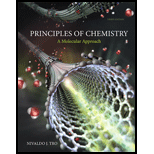
Principles of Chemistry: A Molecular Approach (3rd Edition)
3rd Edition
ISBN: 9780321971944
Author: Nivaldo J. Tro
Publisher: PEARSON
expand_more
expand_more
format_list_bulleted
Concept explainers
Question
Chapter 12, Problem 15SAQ
Interpretation Introduction
Interpretation:
The order of the relative concentrations of each gas in the aqueous solution from highest to lowest is to be stated.
Concept Introduction: The value of Henry’s law constant for different gases at same temperature is different. The solubility of gas in aqueous solution is less if the value of Henry’s law constant is high.
To determine: The order of the relative concentrations of each gas in the aqueous solution from highest to lowest.
Correct answer: The correct option is (a).
Expert Solution & Answer
Want to see the full answer?
Check out a sample textbook solution
Chapter 12 Solutions
Principles of Chemistry: A Molecular Approach (3rd Edition)
Ch. 12 - Prob. 12.1PCh. 12 - Prob. 12.2PCh. 12 - For Practice 12.3 What mass of sucrose...Ch. 12 - Prob. 12.3MPCh. 12 - Prob. 12.4PCh. 12 - Prob. 12.5PCh. 12 - Prob. 12.5MPCh. 12 - Prob. 12.6PCh. 12 - Prob. 12.6MPCh. 12 - Prob. 12.7P
Ch. 12 - Prob. 12.8PCh. 12 - Prob. 12.9PCh. 12 - Prob. 12.10PCh. 12 - Prob. 12.11PCh. 12 - Prob. 12.12PCh. 12 - Prob. 1SAQCh. 12 - Prob. 2SAQCh. 12 - A 500 0-mL sample 01 pure water is allowed to come...Ch. 12 - Prob. 4SAQCh. 12 - Prob. 5SAQCh. 12 - Prob. 6SAQCh. 12 - Prob. 7SAQCh. 12 - Prob. 8SAQCh. 12 - Prob. 9SAQCh. 12 - Which of these aqueous solutions hes the highest...Ch. 12 - Prob. 11SAQCh. 12 - Prob. 12SAQCh. 12 - Prob. 13SAQCh. 12 - Prob. 14SAQCh. 12 - Prob. 15SAQCh. 12 - Prob. 1ECh. 12 - Prob. 2ECh. 12 - Prob. 3ECh. 12 - Prob. 4ECh. 12 - Prob. 5ECh. 12 - Prob. 6ECh. 12 - Prob. 7ECh. 12 - Prob. 8ECh. 12 - Prob. 9ECh. 12 - Use the data in the table to calculate the heats...Ch. 12 - Prob. 11ECh. 12 - Prob. 12ECh. 12 - Prob. 13ECh. 12 - Prob. 14ECh. 12 - Prob. 15ECh. 12 - A KCI solution containng 42 g of KCI per 100.0 g...Ch. 12 - Prob. 17ECh. 12 - Prob. 18ECh. 12 - Prob. 19ECh. 12 - Prob. 20ECh. 12 - Prob. 21ECh. 12 - Prob. 22ECh. 12 - Prob. 23ECh. 12 - Prob. 24ECh. 12 - Prob. 25ECh. 12 - Prob. 26ECh. 12 - Prob. 27ECh. 12 - Prob. 28ECh. 12 - Prob. 29ECh. 12 - Prob. 30ECh. 12 - Prob. 31ECh. 12 - Prob. 32ECh. 12 - Prob. 33ECh. 12 - Prob. 34ECh. 12 - Prob. 35ECh. 12 - Prob. 36ECh. 12 - Prob. 37ECh. 12 - Prob. 38ECh. 12 - Prob. 39ECh. 12 - Prob. 40ECh. 12 - Prob. 41ECh. 12 - Prob. 42ECh. 12 - Prob. 43ECh. 12 - Prob. 44ECh. 12 - Prob. 45ECh. 12 - Prob. 46ECh. 12 - Prob. 47ECh. 12 - Prob. 48ECh. 12 - Prob. 49ECh. 12 - Prob. 50ECh. 12 - Prob. 51ECh. 12 - Prob. 52ECh. 12 - Prob. 53ECh. 12 - Prob. 54ECh. 12 - Prob. 55ECh. 12 - Prob. 56ECh. 12 - Prob. 57ECh. 12 - Prob. 58ECh. 12 - Prob. 59ECh. 12 - Prob. 60ECh. 12 - Prob. 61ECh. 12 - Prob. 62ECh. 12 - Prob. 63ECh. 12 - Prob. 64ECh. 12 - Prob. 65ECh. 12 - Prob. 66ECh. 12 - Prob. 67ECh. 12 - Prob. 68ECh. 12 - Prob. 69ECh. 12 - Prob. 70ECh. 12 - Prob. 71ECh. 12 - Prob. 72ECh. 12 - Prob. 73ECh. 12 - Prob. 74ECh. 12 - Prob. 75ECh. 12 - Prob. 76ECh. 12 - Prob. 77ECh. 12 - Prob. 78ECh. 12 - Prob. 79ECh. 12 - Prob. 80ECh. 12 - An isotonic solution one with the same osmotic...Ch. 12 - Prob. 82ECh. 12 - Prob. 83ECh. 12 - Prob. 84ECh. 12 - Prob. 85ECh. 12 - Prob. 86ECh. 12 - Prob. 87ECh. 12 - Distillation is a method of purification based on...Ch. 12 - Prob. 89ECh. 12 - Prob. 90ECh. 12 - Prob. 91ECh. 12 - Prob. 92ECh. 12 - Prob. 93ECh. 12 - Prob. 94ECh. 12 - Prob. 95ECh. 12 - Prob. 96ECh. 12 - Prob. 97ECh. 12 - Prob. 98ECh. 12 - Prob. 99ECh. 12 - Prob. 100ECh. 12 - Prob. 101ECh. 12 - Prob. 102ECh. 12 - Prob. 103ECh. 12 - Prob. 104ECh. 12 - Prob. 105ECh. 12 - Prob. 106ECh. 12 - Prob. 107E
Knowledge Booster
Learn more about
Need a deep-dive on the concept behind this application? Look no further. Learn more about this topic, chemistry and related others by exploring similar questions and additional content below.Recommended textbooks for you
 ChemistryChemistryISBN:9781305957404Author:Steven S. Zumdahl, Susan A. Zumdahl, Donald J. DeCostePublisher:Cengage Learning
ChemistryChemistryISBN:9781305957404Author:Steven S. Zumdahl, Susan A. Zumdahl, Donald J. DeCostePublisher:Cengage Learning ChemistryChemistryISBN:9781259911156Author:Raymond Chang Dr., Jason Overby ProfessorPublisher:McGraw-Hill Education
ChemistryChemistryISBN:9781259911156Author:Raymond Chang Dr., Jason Overby ProfessorPublisher:McGraw-Hill Education Principles of Instrumental AnalysisChemistryISBN:9781305577213Author:Douglas A. Skoog, F. James Holler, Stanley R. CrouchPublisher:Cengage Learning
Principles of Instrumental AnalysisChemistryISBN:9781305577213Author:Douglas A. Skoog, F. James Holler, Stanley R. CrouchPublisher:Cengage Learning Organic ChemistryChemistryISBN:9780078021558Author:Janice Gorzynski Smith Dr.Publisher:McGraw-Hill Education
Organic ChemistryChemistryISBN:9780078021558Author:Janice Gorzynski Smith Dr.Publisher:McGraw-Hill Education Chemistry: Principles and ReactionsChemistryISBN:9781305079373Author:William L. Masterton, Cecile N. HurleyPublisher:Cengage Learning
Chemistry: Principles and ReactionsChemistryISBN:9781305079373Author:William L. Masterton, Cecile N. HurleyPublisher:Cengage Learning Elementary Principles of Chemical Processes, Bind...ChemistryISBN:9781118431221Author:Richard M. Felder, Ronald W. Rousseau, Lisa G. BullardPublisher:WILEY
Elementary Principles of Chemical Processes, Bind...ChemistryISBN:9781118431221Author:Richard M. Felder, Ronald W. Rousseau, Lisa G. BullardPublisher:WILEY

Chemistry
Chemistry
ISBN:9781305957404
Author:Steven S. Zumdahl, Susan A. Zumdahl, Donald J. DeCoste
Publisher:Cengage Learning

Chemistry
Chemistry
ISBN:9781259911156
Author:Raymond Chang Dr., Jason Overby Professor
Publisher:McGraw-Hill Education

Principles of Instrumental Analysis
Chemistry
ISBN:9781305577213
Author:Douglas A. Skoog, F. James Holler, Stanley R. Crouch
Publisher:Cengage Learning

Organic Chemistry
Chemistry
ISBN:9780078021558
Author:Janice Gorzynski Smith Dr.
Publisher:McGraw-Hill Education

Chemistry: Principles and Reactions
Chemistry
ISBN:9781305079373
Author:William L. Masterton, Cecile N. Hurley
Publisher:Cengage Learning

Elementary Principles of Chemical Processes, Bind...
Chemistry
ISBN:9781118431221
Author:Richard M. Felder, Ronald W. Rousseau, Lisa G. Bullard
Publisher:WILEY
Solutions: Crash Course Chemistry #27; Author: Crash Course;https://www.youtube.com/watch?v=9h2f1Bjr0p4;License: Standard YouTube License, CC-BY